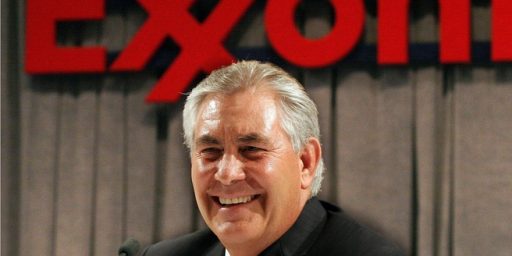Big Oil Is Stupid
Well after reading this post, it must be the case that Big Oil is run by a bunch idiots.
At the start of this month, I joined others in predicting that U.S. gasoline prices would soon be below $2.50 a gallon. The price has already dropped 20 cents to $2.60 a gallon since then, and it now appears likely to go down at least another 30 cents from here.
Now, if as many commenters here have implied and stated outright, that Big Oil was responsible for the run up in gasoline prices and that market conditions played no part, then the conlusion at this point is that Big Oil are fools for letting the price of gasoline fall so low and crimp their massive profits. Of course, the truth of the matter is that Big Oil doens’t have nearly the control that the commenters have implied. As Radley Balko notes,
But who exactly is “Big Oil?” Believe it or not, “Big Oil” is actually “Big Socialism.” The Economist recently looked at the largest oil companies in the world, and found that the thirteen largest oil companies in the world are all state-owned, where all profits go to national governments. These thirteen companies control 90 percent of the world’s oil.
Exxon Mobil, the largest publicly listed company in the world, comes in a measly fourteenth, and controls only a tiny share of the world’ oil reserves.
In other words, “Big Oil” like Exxon Mobil really isn’t all that big in terms of revenue, profits or oil itself. Oooops.
From the article in The Economist,
The NOCs will gradually become even more dominant as oil production dwindles in areas which are open to all comers, such as the North Sea and the Gulf of Mexico. New oil is most likely to be found in the NOCs’ territory, precisely because it is largely out of bounds to multinationals such as Exxon and BP, and so has not yet been thoroughly raked over. In the future, therefore, oil production will be even more concentrated in the hands of the national firms of Russia and the Persian Gulf.
So all the fulminating against the evil Exxon Mobil, BP, et. al. is not only a waste of time, but short sighted and naive.
As for the idea that it isn’t market forces at work here, lets return to James Hamilton’s post on the falling price of gasoline,
So why are gasoline prices coming down so dramatically? There are important seasonal factors in U.S. gasoline prices, which are higher in the summer due to summer fuel requirements and greater gasoline demand. Everyone always seems as shocked when prices go up in the spring as when they come down in the fall, even though to some extent that same pattern is repeated every year. However, much more than just the usual seasonal is in operation this fall. The drop in crude oil prices, down $14/barrel over the last month, has now become the dominating factor.
[snip]
So what is going on? I’ve argued that speculation in oil has in part been driven by the asymmetric payoff structure in a tight market. With limited excess capacity, any supply disruption had the potential to produce quite a spike up in prices, and that possibility may have been regarded as sufficient compensation to speculators for the risk of a price decline that would be expected to occur if none of those events took place. But we’re now operating on the flip side of that same calculation– hurricanes have so far failed to disrupt this season’s production of oil from the Gulf of Mexico and the conflict with Iran seems to be playing out as an awkward standoff. The absence of bad news means prices had to drop.
Furthermore, there is some evidence that petroleum demand is finally starting to be tamed, which is of course one way to create more excess production capacity in the world oil market. My concern here is that the incipient economic slowdown may be the most important factor responsible for declining petroleum demand. And to the extent that’s the story, the oil price declines are not exclusively a harbinger of good economic news.
In economics we call all of this, market forces.





Steve you obvious dupe. Gas prices going up is obviously the result greedy private oil cashing in on their control of Bush before he is impeached come the revolution next November. Gas prices going down are either a last desperate ploy of greedy private oil desperately and uselessly trying to prop up Bush their puppet for November or maybe it is the result of the benign influence of the 13 socialist companies in solidarity with unionized working men and women. I’m not sure yet which because the tin foil hat has been blocking DNC messages.
Steve,
I actually agree with you! Quick, throw in some jab at Christians or Law Enforcement and all will be right with the world; my little world. 🙂
All sarcasm aside, I totally agree and really thought this stuff was taught in most college macroeconomic classes.
It IS taught in most college macroeconomics classes – but depressingly few majors actually require you to take that class to earn a degree.
LOL, thanks for that.
Fersboo,
Russell has pointed out the sad reality of the situation.
Yes, no oil company exec ever shut down a refinery to drive up prices! Or neglected a integral pipeline because if they have to shut it down, it just drives their prices higher…thanks BP!
Also Bush did not stop filling the petroleum reserve until he needed to lower prices to help his friends this election cycle…When pressed to do something earlier this summer when prices were sky high, he said it was important to have a full reserve…funny how it still isn’t full, but he stopped filling it.
Also would any of you like to bet prices won’t go up after the election?
Let’s be specific, Lord Browne of BP is a fool.
We are coordinating a movement to have Lord Browne of BP resign.
He spent big money on “green” public relations ads then skimped on the maintenance of the Alaskan pipeline and safety procedures at their production facilities.
Now BP is being sued by shareholders and investigated by Congress. To no surprise, BP stock price trails Exxon since the management errors became public.
BP is a textbook example of what happens when companies adopt corporate social responsibility (CSR).
We are sending a message for Lord Browne to resign via our advocacy portal.
While it is true that refinery capacity is a big factor in gasoline price volatility, there is a second part of this that madmatt convienently ignores, that no new refineries have been built. With profits sky high, you’d think somebody might want to get in on that game, but oddly this isn’t the case. Could it be that environmental regs are having an impact (contra what economic whiz kids like Drum, et. al. assert)?
As for the pipeline shut down, I’m curious…did they actually profit off of that? Did the increase in price result in a net gain or loss. For example, if a firm produces say 200 units at $2 a price, a loss of capacity that means a price incrase below $2/unit (i.e. total price is $4 or less) means the firm either maintains profits or sufferes a loss.
How long after the election? The very next day? A week, a month, the next driving season? And by how much? The price fluctuates every day, both up and down.
Actually, I seem to recall speculation on gas prices getting to be as high as $5/gallon because of that pipeline shutdown. And yet, as I sit here today, gas prices are in freefall and the pipeline is still shut down.
So much for that theory. In fact, thanks, BP, for driving the cost of gas down!
Let me get this straight, lower fuel costs are BAD for the economy? So I guess the higher prices are actually good! Tell that to the Democrats!